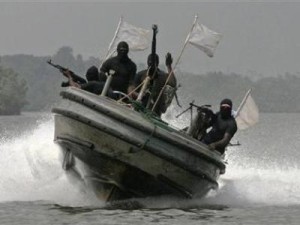Nigerian waterways are regarded as some of the most dangerous in the world. According to the International Maritime Bureau, all waters in and off Nigeria remain risky. And as a […]
The post Pirate attacks on Nigerian waters appeared first on Ships & Ports.

Nigerian waterways are regarded as some of the most dangerous in the world. According to the International Maritime Bureau, all waters in and off Nigeria remain risky. And as a result all vessels are advised to be vigilant and take extra anti-piracy precautions, as many attacks may have gone unreported. This is owing to the fact that while sea piracy seems to be on a decrease globally, it is increasing at a disturbing rate in the Gulf of Guinea. In a report by International Chambers of Commerce there were a total of 87 reported cases of piracy in the first half of 2017. The report further states that 63 crew were taken hostage within the period while 41 were kidnapped from their vessels, three injured and two killed. Disturbingly, in Nigeria, there has been abduction of 31 crew in five reported cases in the first half of 2017 alone. In fact, the report indicates that half of all reports of vessels being fired upon come from Nigeria. In other words, sea pirates are having a full time on Nigerian sea.
The economic implications of piracy are enormous. It kills business and hampers the growth of the maritime industry. The oil and gas industry in Nigeria, perhaps, would have been more developed without piracy, and would have translated to more revenue for the government. As a result of this appalling situation, it has become more expensive for ships to come into Nigeria, because sailing into the country can be likened to embarking on a voyage to a possible point of no return.The economic implications of piracy are just too many to disdain. Virtually all sectors of the economy are affected by piracy. This is not only devastating to the growth of the maritime industry in Nigeria; it is unacceptably debilitating to our economic advancement as a nation. The growth of sea piracy can also rub off on other illegal businesses such as human trafficking, smuggling and narcotics, which are all interconnected.
There are varied categories of pirates on the Nigerian waters. Some are heavily armed with sophisticated weapons, while others are mere robbers with minimal weapons. The ones with sophisticated weapons often seize their victims into unknown space where they ransack and completely take everything from the captives. Sometimes, hostages are only released after heavy ransom has been paid. The incidence of piracy has been further amplified by the inability of the government to mop up illegal weapons in the hands of youths especially the militants in the Niger Delta. This is in addition to the international dimension of the syndicates responsible for the piracy in the Gulf of Guinea.
In recognition of the threat piracy poses to the countries within the Gulf of Guinea, especially Nigeria, the United Nations advocated international collaboration to tackle the nuisance in affected countries. It is, however, pleasing to hear some cheering news from the Minister of Defence that piracy is reducing in Nigeria based on the available data for 2017.The Minister, Mansur Dan-Alistated that pirates attacks have reduced on Nigerian waters from 55 attempted attacks and 36 successful in 2016 to four successful attacks out of 16 attempts in 2017.
This shows that the government has been making effort to curb piracy in the country. The Nigerian navy has made considerable progress in the fight against these criminals. The ongoing anti-piracy operation, ‘Operation TsareTeku’ is a step in the right direction.The successes that have been recorded can be improved upon if the government can equipthe navy better. The pirates have grown into becoming a major cartel with all the necessary sophisticated ammunitions required to fight a battle on the sea. To fight them successfully demands that the government provides the necessary ammunitions to enable the navy confront the criminalsfrontally. Fighting piracy to a halt will further boost investors’ confidence that the Nigerian waters are safe for maritime business. It will attract more vessels into the country and contribute greatly to the growth of the maritime industry in Nigeria. Curbing piracy is definitely a good way to deal with other criminal activities that fester on the sea.
It is important for Nigeria to also key into international collaboration in information sharing especially with neighbouring countries in the West African sub-region. If Nigeria is able to successfully curb sea piracy, we would be adding significant value to our economy, which will also boost investors’ confidence in our economy. In the same way, safe waterways also connotes that we can begin to explore water transportation for inter-state travels in a commercially viable way. The problem has always been the fluctuation in successes recorded. For instance, the data in 2017 shows improvement when compared with 2016; however, the 2017 data is still below the success in 2015. We need to sustain the success. The reality is that piracy is still a major problem in Nigeria.
The post Pirate attacks on Nigerian waters appeared first on Ships & Ports.

